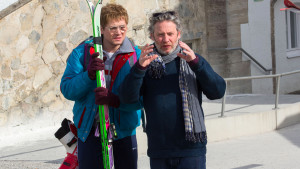Eddie the Eagle is the triumphant story (check out our review here) of Eddie Edwards, the British ski jumper who refused to give in to pressures to quit until he achieved his ultimate goal – to represent his country as an Olympian in the 1988 Winter Olympics in Calgary.
We caught up with director Dexter Fletcher for an exclusive chat where he took us inside the making of this inspiring film and talked about the brilliance of his stars (Taron Egerton and Hugh Jackman), the irresistible tenancy of the film’s real-life subject and how the 80s-synthesizer score was a risk, but one that paid off in droves!
The Movie Mensch: There is so much that is inspirational about Eddie and his world. Diving into his history, what most surprised you about Eddie?
Dexter Fletcher: Seems almost obvious to say, his single-mindedness, I suppose. But no, even now as an older man, ski jumping is still a part of his life. He’s still so passionate about it. He’s involved in the sport. I suppose it was coming into something in his twenties. He didn’t go into it to become famous or inspirational story for people. It was all about his own ends – to become an Olympian in ski jumping and be involved. There’s this kind of side of him that, even now, that is still surprising, that he’s not what I would call media savvy. Someone now, would say to themselves, “How do I work this to become a sort of media personality?” He did it. That was never part of his plan. He’s still surprised by all of this attention. He’ still passionate about the sport and being involved in it and he just still wants to be a part of it. All the other aspects, the fame, are all well and good. He’s still just focused on how he can jump again. I mean, he just jumped again for charity 9laughs]. And he’s 62! When I met him, he said he was in better shape now than when he went to the Olympics. He’s still talking, thinking and evolving at that level. That’s why it was important to make a film that was not just showed him as someone who became famous for what he did. He’s not a joke. He’s inspirational and admirable.
The Movie Mensch: No question, that comes through in Eddie the Eagle. A large part of that is the story, and the great script that paints that picture, but the performance of Taron Egerton. I don’t think you have half the movie you have without that guy’s performance. What was it about him that you knew, he was your Eddie?
Dexter Fletcher: It’s appears effortless for him, but of course it is not effortless. When he comes to the set he is so ready. He has a real passion and admiration for Eddie as well. That was all this desire on his part to not diminish what Eddie achieved. There was this immense effort to create perfection when he was making that character. I saw him first in Testament of Youth, which is a really different kind of film, a really dramatic role. He has this kind of empathy for the character he’s playing. He brought that to Kingsmen as well and I think that’s what makes him so relatable and likable. It’s not art. He’s not watching himself as he acts, if you know what I mean. There’s a freedom to what he’s doing that allows us as an audience to appreciate him and being in that performance with him. Some actors, for me, it’s hard not to sit around and over analyze what you’re doing. It’s very difficult acting, and it’s hard to not do that. But Taron has this freedom in it. It’s well planned and thought out. When he comes, he’s very much in the moment. He’s connected to who he’s talking to. He wanted to impress Hugh. He wanted to get in there and make him proud. It’s great to be in the arena, or on the stage, with someone who’s great. And that’s Taron when he enters every scene. He also treated it with a huge amount of respect.
The Movie Mensch: One thing that was surprising, but in the best of ways, was the score. It could not have been more 80s. Yet, the thing about 80s films that used a synthesizer soundtrack is you watch them now and they can feel dated. This film, it felt like it put us in that time period. Was there any risk, you felt, in having a 80s-synch soundtrack? Did the studio push back?
Dexter Fletcher: Matthew Margesonis the composer, and he worked with Matthew Vaughn on The Kingsman and he was the one who told me I have to work with him, he said he’s great. Early on he told me he had this thing in his head about what he wanted to do with it. We were doing a period piece and we needed to use the instruments of the period. That gives you the period so strongly. I think that something we decided on straight away. We asked ourselves, “What was going on in that period musically?” It was all synthesizers and electronic music was being born. All the composition was done on those old electronic instruments. It became obvious that these great things were taking us back to those periods in our life. It truly captures the moment.


